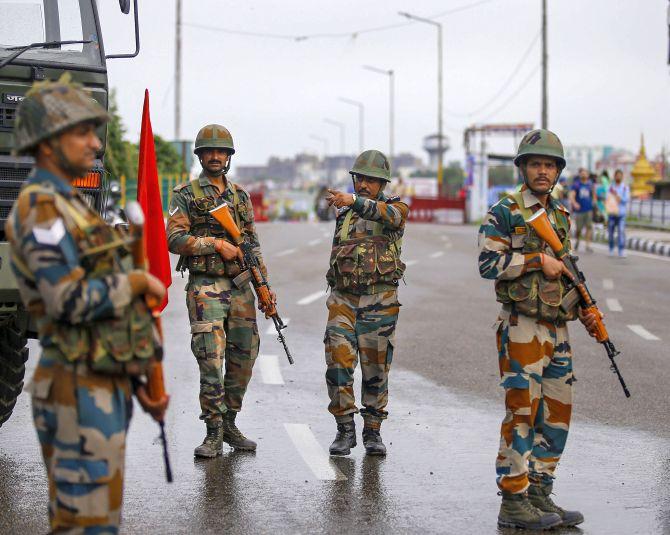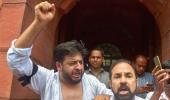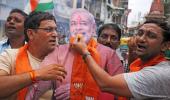‘Now you have a full clampdown and a huge security blanket. How long are you going to maintain that?’
‘The moment you lift it, all that suppressed protest and anger will come out.’

Historian Dr Radha Kumar was one of the three interlocutors for Jammu and Kashmir appointed by the Manmohan Singh government in 2010.
As interlocutor, she travelled extensively in Jammu and Kashmir and held consultations with all stakeholders. The interlocutors' report was submitted to then home minister P Chidambaram in October 2011. The Manmohan Singh government took no action on the report.
How will the abrogation of Article 370 and Kashmir’s altered status as a Union Territory play out in the Valley once the security clampdown is withdrawn?
Rediff.com’s Archana Masih reached out to Dr Kumar for her informed understanding of the historical events unfolding in Kashmir and New Delhi.
“Pakistan is now going to flood the Valley with arms and with far more attempts at cross border infiltration. Now the government will say they were doing that anyway, but there was a difference in scale. They (Pakistan) will now double their effort 10 times,” cautions Dr Kumar, author of the just published Paradise At War, A Political History of Kashmir (Aleph), in the first of a two-part interview.
Will Kashmir continue to remain in a state of siege in the immediate future?
I see no way that it will not. You are passing these Bills and right now you have a full clampdown and a huge security blanket. How long are you going to maintain that? The moment you lift it, all that suppressed protest and anger will come out.
In fact, I think we are being completely complacent thinking that a security blanket will necessarily curb it, it may not.
Militant attacks take time. It will not appear in one day just like it was in Burhan Wani’s time. In months we will see it emerge, more people will take to the gun.
These are all very negative predictions and let me say that you can never be sure of any predictions and one should always hope for the best. Hoping for the best should not lead you to closing your eyes to what should be blatantly obvious because history has shown us this over and over again.
Contrary to 370 being a blunder, the provisions in 370 are those that are made in the Instrument of Accession which was negotiated by Gopalaswami Aiyyangar, Sardar Patel and other Cabinet leaders, unlike this government which keeps people ignorant. At that time information and actions was shared.
This was something that was felt to be necessary, that was made part of the Constitution of India, and this government has overturned it.
We have seen even earlier, historically, that every time Article 370 was hollowed out, anger, cynicism, protests rose in the Valley.
The blunder was hollowing it out. It is also equally true that frequently Kashmiri politicians used Article 370 and New Delhi’s insecurity to get rid of opponents, to make governments fall, they certainly misused Article 370.
They did not use it to bring benefits but that is not a problem with 370 per se, that is the problem of the way that relationship took off from the moment of Sheikh Abdullah’s arrest.
One should not mistake the woods for the trees of what may be an associated problem. It is not something rooted in the Article or the provisions themselves.
Do you think Indians from other parts of the country will settle down in Kashmir?
This is what this government is trying to encourage. However, when we talk about demographic change what are we talking about – let us say 60% of the total population is Muslim that runs into millions -- now if you want to reduce that to a minority, millions of Hindus will have to go and settle there.
There are no jobs there, the economy does not offer much, people generally don’t tend to leave their home and work to go off to some place they know nothing about. Unless you have managed to cultivate an Israeli settler kind of approach. What is more likely to happen is that there is going to be a lot of land grab and real estate problems that could well arise.
I do not close my eyes to the communalism that does exist in the Valley. We know how many Pandits had to make distress sales and just leave. There has been a steady trickle of Sikhs out of the Valley making distress sales.
If we are thinking of a democracy -- which nowadays I fear that we may not have much left -- but if we were thinking like a democracy, we will be thinking how many distress sales and what kind of legal problems will arrive out of that.
Those would be the kind of questions we should ask -- by opening this door have we created yet another dreadful situation?
The Centre believes this will lead to more investment and development. Is this realistic?
Not at all. Again, I would say that true there was a problem in J&K for investors and industry. Outside industry could only lease land for a short term. They were very reluctant to give long term leases especially in the Mehbooba government.
Of course, no industry is going to go if they have a 30 year lease. They need a minimum 90 year lease to be able to establish themselves.
But the truth is that industry will be reluctant to go given the volatility and violence that frequently breaks out in the state.
At this point of time when industry is not making investment in even peaceful states there is dim hope.
Manmohan Singh tried his best and got commitments from several leading industrialists at a time when the economy was growing. It was a time the peace process was showing that Kashmir was returning to some level of peace and prosperity.
But even that effort in the end did not yield much. Manmohan got the biggest industrial houses to sign on, but very little came out. They hired some Kashmiris, they set up some training programmes, but they did not set up much in the state.
In fact, they did not set up anything in the state.
What makes me saddest of all is that the empirical evidence is all there to disprove every single claim these people are making but we have decided not to look at the evidence.
By ‘we’, I mean the media as well as the government as well as parliamentarians. One may criticise the government, but what about all these parliamentarians? They couldn’t even make the debate for 3-4 days! And it was such an important Constitutional change.
The stealth with which it was done in contravention of democratic norms and the use of force -- what does it tell us about the future of our democracy?
Frankly, we have reduced democracy to a hollow word.
Look at what is happening at other states as well. If the BJP can induce legislators in one way or the other to defect after they have been elected on a different platform and in many cases, an opposing platform, I as a voter, ask myself what is the point of voting?
This is not democracy -- that my legislator doesn’t even bother to ask me before he defects to another party.
The anti-defection law doesn’t seem to work at all because nobody seems to apply it. Now you see a judgment in the Delhi high court disqualifying an AAP legislator for defecting, but in Goa no action is taken.
You go on about one Constitution one country. Please make the anti-defection law work across the country.
You have met and held consultations with Kashmiris of all sides. They wanted autonomy but what they have got is UT status with direct rule from New Delhi contrary to Kashmiri aspirations. How will this play out on the ground?
This will give impetus to anti-India. That can be pro-Pakistan or pro-Independence. Both of those sentiments are going to grow much stronger. We tend to forget various things.
As it is over the past 5 years there has been a huge development of people coming out to stop anti-militant operations. They have been given a chance to do that again.
The BJP will say that we will control that and they won’t dare because security forces are there. But for how long? We come back to that question: Are you going to turn it into a military-police state for perpetuity?
We don’t have the resources to do that and neither do we want to do that. It is totally contradictory in our efforts to say that these are our citizens.
Were the arrests of former chief ministers Mehbooba Mufti and Omar Abdullah really necessary?
They would surely have protested very loudly, and the government did not want loud protests.
In any case, what one hears from the Valley is that they are putting all sorts of pressures on legislators to be silent – whether it is tax evasion or corruption or hanging out with the Hurriyat.
What message do you think the Centre was trying to send by muzzling Kashmir’s most pro-India voices?
I heard a commentator (I think it was Praveen Swami) say that in one stroke they have united all opposition to India. How does it serve any good for the country?
How can it possibly serve the national interest? Not only that, you should know -- unless you are ignorant -- that Pakistan is now going to flood the Valley with arms and with far more attempts at cross border infiltration.
Now the government will say they were doing that any way, but there was a difference in scale. They (Pakistan) will now double their effort 10 times.
The kind of international pressure that used to be put on Pakistan, will that continue? Of course, we will be told that the US will not put that kind of pressure because it has to withdraw from Afghanistan.
There is no doubt that what’s going on in Afghanistan has and will have an impact on Kashmir. Historically, Afghanistan has always had an influence on what happens in Kashmir. But it has had much less of an influence than it could have – the influence and interest has waxed and waned.
But in this current juncture with the situation as it is, it is likely that Afghanistan will become more of a sanctuary for anti-India jihadis.
What have been the takeaways in the manner in which the government undertook its Article 370 mission?
The first and very obvious one is that they believed that all the political elements in the Kashmir Valley would be opposed, and that’s why the put the leaders of the Opposition parties under house arrest, and they flew 35,000 -- maybe more -- troops in.
Clearly, they saw this as a very unpopular move as far as the people of the Valley were concerned. Yet, they have continued with it and have not given us any adequate explanation for what made this move necessary and why at this point in time?
It was taken with no consultation with Kashmiri political leaders or representatives of public opinion in the state. The Bill was brought in absolute stealth.
To me, the President’s order violates the Constitution, in so far he extends all the provisions of the Indian Constitution to the state.
It not only violates the Constitution, but the provisions of the Instrument of Accession. There is no recognition of this violation and no explanation about what are the extraordinary circumstances that made you take such a step.
The absolute overturning of all democratic norms clearly emerges in the order and the Bill. The Bill was not listed, there was no debate, it was not put in the public domain before being passed. There was no attempt to consult.
Any change to 370 has to be done in consultation with the Constituent or legislative assembly which was not done -- in any case there is no legislative assembly as the state is under President’s rule.
The suspicion that emerges is that they are doing this under President’s Rule because they know that if there was a legislative assembly and an elected government, they would not be able to do it.
Now we have an explanation for why they have constantly extended President’s Rule. They wanted to ram through what is clearly an unpopular measure and do away with every democratic convention. They hold a vote in the Rajya Sabha when the norm is that the elected Lower House has to first pass a Bill, and then it is sent to the Upper House for consideration.
When you look at this you think, is there even one thing they have done according to the Constitution of India and our democratic practices?
Clearly, there is no problem holding elections for the legislative assembly when you have held elections for the Lok Sabha and the panchayat.











 © 2025
© 2025